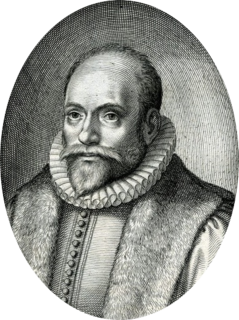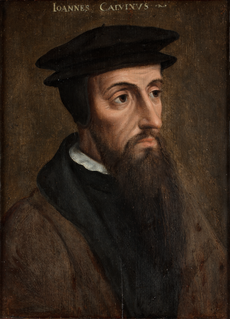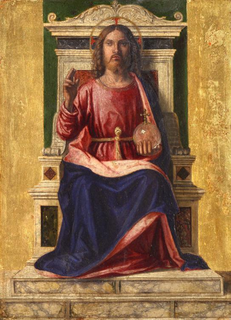
Arminianism is a major branch of Protestantism based on the theological ideas of the Dutch Reformed theologian Jacobus Arminius (1560–1609) and his historic supporters known as Remonstrants. Dutch Arminianism was originally articulated in the Remonstrance (1610), a theological statement submitted to the States General of the Netherlands. This expressed an attempt to moderate the doctrines of Calvinism related to its interpretation of predestination. The Synod of Dort (1618–19) was called by the States General to consider the Five Articles of Remonstrance.

Calvinism is a major branch of Protestantism that follows the theological tradition and forms of Christian practice set down by John Calvin and other Reformation-era theologians. It emphasises the sovereignty of God and the authority of the Bible.

Predestination, in Christian theology, is the doctrine that all events have been willed by God, usually with reference to the eventual fate of the individual soul. Explanations of predestination often seek to address the "paradox of free will", whereby God's omniscience seems incompatible with human free will. In this usage, predestination can be regarded as a form of religious determinism; and usually predeterminism, also known as theological determinism.

Perseverance of the saints is a Christian teaching that asserts that once a person is truly "born of God" or "regenerated" by the indwelling of the Holy Spirit, they will continue doing good works and believing in God until the end of their life.

Total depravity is a Protestant theological doctrine derived from the concept of original sin. It teaches that, as a consequence of man's fall, every person born into the world is enslaved to the service of sin as a result of their fallen nature and, apart from the efficacious (irresistible) or prevenient (enabling) grace of God, is completely unable to choose by themselves to follow God, refrain from evil, or accept the gift of salvation as it is offered.

Predestination is a doctrine in Calvinism dealing with the question of the control that God exercises over the world. In the words of the Westminster Confession of Faith, God "freely and unchangeably ordained whatsoever comes to pass." The second use of the word "predestination" applies this to the salvation, and refers to the belief that God appointed the eternal destiny of some to salvation by grace, while leaving the remainder to receive eternal damnation for all their sins, even their original sin. The former is called "unconditional election", and the latter "reprobation". In Calvinism, some people are predestined and effectually called in due time to faith by God, all others are reprobated.

In Western Christian theology, grace is the help given to us by God because God desires us to have it, not necessarily because of anything we have done to earn it. It is understood by Christians to be a spontaneous gift from God to people – "generous, free and totally unexpected and undeserved" – that takes the form of divine favor, love, clemency, and a share in the divine life of God.

In Christian theology, synergism is the position of those who hold that salvation involves some form of cooperation between divine grace and human freedom. Synergism is upheld by the Roman Catholic Church, Orthodox Churches, and Methodist Churches. It is an integral part of Arminian theology.
Semi-Pelagianism is a Christian theological and soteriological school of thought on salvation. Semipelagian thought stands in contrast to the earlier Pelagian teaching about salvation, the Pelagianism, which had been dismissed as heresy. Semipelagianism in its original form was developed as a compromise between Pelagianism and the teaching of Church Fathers such as Saint Augustine, who taught that people cannot come to God without the grace of God. In semipelagian thought, therefore, a distinction is made between the beginning of faith and the increase of faith. Semipelagian thought teaches that the latter half – growing in faith – is the work of God, while the beginning of faith is an act of free will, with grace supervening only later. It too was labeled heresy by the Western Church at the Second Council of Orange in 529.

Unconditional election is a Calvinist doctrine relating to predestination that describes the actions and motives of God prior to his creation of the world, when he predestined some people to receive salvation, the elect, and the rest he left to continue in their sins and receive the just punishment, eternal damnation, for their transgressions of God's law as outlined in the Old and New Testaments of the Bible. God made these choices according to his own purposes apart from any conditions or qualities related to those persons.

Limited atonement is a doctrine accepted in some Christian theological traditions. It is particularly associated with the Reformed tradition and is one of the five points of Calvinism. The doctrine states that though the death of Jesus Christ is sufficient to atone for the sins of the whole world, it was the intention of God the Father that the atonement of Christ's death would work itself out in only the elect, thereby leading them without fail to salvation. According to Limited Atonement, Christ died for the sins of the elect alone, and no atonement was provided for the reprobate. This is in contrast to a belief that God's prevenient grace enables all to respond to the salvation offered by God in Jesus Christ Acts 2:21 so that it is each person's decision and response to God's grace that determines whether Christ's atonement will be effective to that individual.

Irresistible grace is a doctrine in Christian theology particularly associated with Calvinism, which teaches that the saving grace of God is effectually applied to those whom He has determined to save and, in God's timing, overcomes their resistance to obeying the call of the gospel, bringing them to faith in Christ. It is to be distinguished from prevenient grace, particularly associated with Arminianism, which teaches that the offer of salvation through grace does not act irresistibly in a purely cause-effect, deterministic method, but rather in an influence-and-response fashion that can be both freely accepted and freely denied.
Prevenient grace is a Christian theological concept rooted in Arminian theology, though it appeared earlier in Catholic theologies. It is divine grace that precedes human decision. In other words, God will start showing love to that individual at a certain point in his lifetime.

Assurance, also known as the Witness of the Spirit, is a Protestant Christian doctrine that states that the inner witness of the Holy Spirit allows the Christian disciple to know that they are justified. Based on the writings of St. Augustine of Hippo, assurance was historically a very important doctrine in Lutheranism and Calvinism, and remains a distinguishing doctrine of Methodism and Quakerism though there are differences among these Christian traditions. Hymns that celebrate the witness of the Holy Spirit, such as "Blessed Assurance" are sung in Christian liturgies to celebrate the belief in assurance.
Eternal security, also known as "once saved, always saved", is the belief that from the moment anyone becomes a Christian, they will be saved from hell, and will not lose salvation. Once a person is truly "born of God" or "regenerated" by the indwelling of the Holy Spirit, nothing in heaven or earth "shall be able to separate (them) from the love of God" and thus nothing can reverse the condition of having become a Christian.

Monergism is the view within Christian theology which holds that God works through the Holy Spirit to bring about the salvation of an individual through spiritual regeneration, regardless of the individual's cooperation. It is most often associated with the Reformed tradition and its doctrine of irresistible grace, and particularly with historical doctrinal differences between Calvinism and Arminianism. This position contrasts with Arminian synergism, the belief that God and individuals cooperate to bring individuals salvation.

The history of the Calvinist–Arminian debate begins in early 17th century in the Netherlands with a Christian theological dispute between the followers of John Calvin and Jacobus Arminius, and continues today among some Protestants, particularly evangelicals. The debate centers around soteriology, or the study of salvation, and includes disputes about total depravity, predestination, and atonement. While the debate was given its Calvinist–Arminian form in the 17th century, issues central to the debate have been discussed in Christianity in some form since Augustine of Hippo's disputes with the Pelagians in the 5th century.
Free will in theology is an important part of the debate on free will in general. Religions vary greatly in their response to the standard argument against free will and thus might appeal to any number of responses to the paradox of free will, the claim that omniscience and free will are incompatible.
Free grace is a Christian soteriological view that anyone can receive eternal life the moment they believe that Jesus is the Christ, the Son of God. Free Grace advocates believe that good works are not the condition to merit, maintain, or to prove eternal life, but rather are part of discipleship and the basis for receiving eternal rewards.

Augustinian Calvinism is a term used to emphasize the origin of John Calvin's theology within Augustine of Hippo's theology over a thousand years earlier. By his own admission, John Calvin's theology was deeply influenced by Augustine of Hippo, the fourth-century church father. Twentieth-century Reformed theologian B. B. Warfield said, "The system of doctrine taught by Calvin is just the Augustinianism common to the whole body of the Reformers." Paul Helm, a well-known Reformed theologian, used the term Augustinian Calvinism for his view in the book "The Augustinian-Calvinist View" in Divine Foreknowledge: Four Views.











